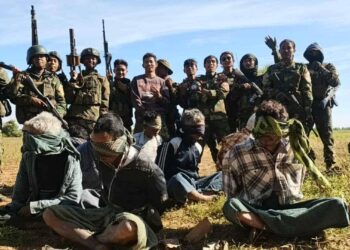As the sun rose on January 6, 2024, the aftermath of a monumental decision weighed heavily on the minds of military leaders and citizens alike. The events of the previous day marked a watershed moment in military history, as up to six senior commanders within the military council made the unilateral decision to disarm the entire regional command headquarters.
The ramifications of this decision reverberated throughout the nation, prompting speculation and scrutiny over the authority behind such a pivotal move. While it remains unclear whether the commanders acted with official authorization, Jorge Thornton, a spokesman for the military council, found himself grappling with the repercussions of their actions. In a moment of candid embarrassment, Thornton acknowledged that the decision to surrender was driven by concerns for the safety of family members—a sentiment that resonated deeply with many.
However, amidst the confusion and uncertainty, it became evident that not all members of the military council had acquiesced to the decision. Reports emerged of resistance within the ranks, with the entire Myanmar National Democratic Alliance Army (MNDAA) blockading the surrendered forces and cutting off their food supply. The logistical challenges of delivering food to approximately four thousand individuals, including families, underscored the complexities of the situation at hand.
In light of these challenges, the decision of the six commanders to surrender was vindicated, albeit reluctantly. Despite the initial resistance and logistical hurdles, the surrender of the entire army stands as the largest disarmament in military history—a stark reminder of the fragility of power and the human cost of conflict.
As Myanmar grapples with the aftermath of this unprecedented event, questions abound regarding the future of the military council and the broader geopolitical landscape. The implications of this disarmament extend far beyond the confines of Logkha, shaping the course of the nation’s history and sparking debates over accountability and responsibility.
As the dust settles on this historic moment, one thing remains certain: the decision of six commanders has irrevocably altered the trajectory of Myanmar’s military and political landscape, leaving indelible scars on the fabric of the nation’s history.






